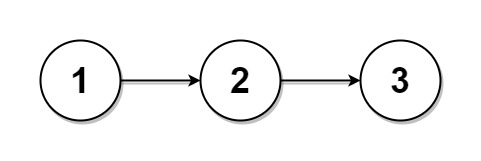Algorithm
Problem Name: 725. Split Linked List in Parts
Given the head of a singly linked list and an integer k, split the linked list into k consecutive linked list parts.
The length of each part should be as equal as possible: no two parts should have a size differing by more than one. This may lead to some parts being null.
The parts should be in the order of occurrence in the input list, and parts occurring earlier should always have a size greater than or equal to parts occurring later.
Return an array of the k parts.
Example 1:

Input: head = [1,2,3], k = 5 Output: [[1],[2],[3],[],[]] Explanation: The first element output[0] has output[0].val = 1, output[0].next = null. The last element output[4] is null, but its string representation as a ListNode is [].
Example 2:

Input: head = [1,2,3,4,5,6,7,8,9,10], k = 3 Output: [[1,2,3,4],[5,6,7],[8,9,10]] Explanation: The input has been split into consecutive parts with size difference at most 1, and earlier parts are a larger size than the later parts.
Constraints:
- The number of nodes in the list is in the range
[0, 1000]. 0 <= Node.val <= 10001 <= k <= 50
Code Examples
#1 Code Example with C++ Programming
Code -
C++ Programming
class Solution {
public:
vector<ListNode*> splitListToParts(ListNode* root, int k) {
vector<ListNode*>res;
int len = 0;
ListNode* head = new ListNode(0), *pre = root, *cur = head, *next, *p = root;
while(p && ++len) p = p->next;
int m = len % k, l = len / k;
while(k--){
cur->next = pre;
for(int i = 0; i < l; i++) cur = cur->next;
if(m) cur = cur->next, m--;
next = cur->next;
cur->next = NULL;
res.push_back(pre);
pre = next;
cur = head;
}
return res;
}
};
Input
Output
#2 Code Example with Java Programming
Code -
Java Programming
class Solution {
public ListNode[] splitListToParts(ListNode head, int k) {
ListNode[] arr = new ListNode[k];
int nodeLength = 0;
for (ListNode curr = head; curr != null; curr = curr.next) {
nodeLength++;
}
int n = nodeLength / k;
int remaining = nodeLength % k;
ListNode prev = null;
for (int i = 0; i < k && head != null; i++, remaining--) {
arr[i] = head;
for (int j = 0; j < n + (remaining > 0 ? 1 : 0); j++) {
prev = head;
head = head.next;
}
prev.next = null;
}
return arr;
}
}
Input
Output
#3 Code Example with Javascript Programming
Code -
Javascript Programming
const splitListToParts = function(root, k) {
let cur = root;
let N = 0;
while (cur != null) {
cur = cur.next;
N++;
}
let width = Math.floor(N / k),
rem = N % k;
let ans = [];
cur = root;
for (let i = 0; i < k; ++i) {
let head = cur;
for (let j = 0; j < width + (i < rem ? 1 : 0) - 1; ++j) {
if (cur != null) cur = cur.next;
}
if (cur != null) {
let prev = cur;
cur = cur.next;
prev.next = null;
}
ans[i] = head;
}
return ans;
};
Input
Output
#4 Code Example with Python Programming
Code -
Python Programming
class Solution:
def splitListToParts(self, root: ListNode, k: int) -> List[ListNode]:
n = 0
node = root
while node:
n += 1
node = node.next
count = n // k
residual = n % k
i = 0
ret = [[] for _ in range(k)]
prev = root
while prev and k > 0:
node = prev
leftover = count
ret[i] = node
i += 1
while node and leftover > 1:
node = node.next
leftover -= 1
if node and count != 0 and residual:
node = node.next
residual -= 1
prev = node.next if node else None
if node:
node.next = None
k -= 1
return ret
Input
Output
